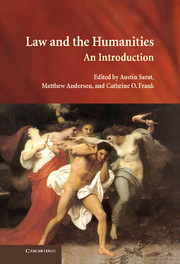Book contents
- Frontmatter
- Contents
- Contributors
- Acknowledgments
- Introduction: On the Origins and Prospects of the Humanistic Study of Law
- I PERSPECTIVES ON THE HISTORY AND SIGNIFICANCE OF SCHOLARSHIP IN LAW AND THE HUMANITIES: THREE VIEWS
- 1 A Humanities of Resistance: Fragments for a Legal History of Humanity
- 2 Three Tales of Two Texts: An Introduction to Law and the Humanities
- 3 Law, Culture, and Humility
- II IDEAS OF JUSTICE
- III IMAGINING THE LAW
- IV LINGUISTIC, LITERARY, AND CULTURAL PROCESSES IN LAW
- V INSTITUTIONAL PROCESSES
- Index
- References
1 - A Humanities of Resistance: Fragments for a Legal History of Humanity
Published online by Cambridge University Press: 20 January 2010
- Frontmatter
- Contents
- Contributors
- Acknowledgments
- Introduction: On the Origins and Prospects of the Humanistic Study of Law
- I PERSPECTIVES ON THE HISTORY AND SIGNIFICANCE OF SCHOLARSHIP IN LAW AND THE HUMANITIES: THREE VIEWS
- 1 A Humanities of Resistance: Fragments for a Legal History of Humanity
- 2 Three Tales of Two Texts: An Introduction to Law and the Humanities
- 3 Law, Culture, and Humility
- II IDEAS OF JUSTICE
- III IMAGINING THE LAW
- IV LINGUISTIC, LITERARY, AND CULTURAL PROCESSES IN LAW
- V INSTITUTIONAL PROCESSES
- Index
- References
Summary
I first realized that there was something strange about the term “Humanities” when, as the director of my university's Humanities Institute, I participated in a meeting to set up a European Consortium of Humanities Centers. Except for the host center in Utrecht and mine, no other participating European university had a Humanities Institute. The aspiring founding fathers and mothers came from single disciplines: Archeology, English, Dutch, Media, and Philosophy. Then it struck me: No proper or widely used term translates the term Humanities in Greek or Italian, their supposed mother tongues. The Humanities, despite their desperate look eastward and backward, are a consummately modern and decidedly American invention. No faculties, courses, or centers for the Humanities existed in European universities until recently. The few British exceptions – of which my own institution is a shining example – do not follow a long tradition of Humanities education. They are, rather, the result of our “special relationship” with our transatlantic cousins and of the managerial culture that has replaced the older genteel governance of universities, and is perennially trying – and on the whole failing – to create economies of scale, grant-producing interdisciplinary initiatives, and a teaching, scholarship, and evaluation culture that rather pathetically imitates the marketplace.
What are the Humanities? According to the flourishing American debate, the Humanities have been defined in two related ways.
- Type
- Chapter
- Information
- Law and the HumanitiesAn Introduction, pp. 49 - 72Publisher: Cambridge University PressPrint publication year: 2009
References
- 2
- Cited by

